How to Seamlessly Move From Supplier Discovery to Selection to Negotiation


Key Takeaways:
Finding the right supplier should be easy.
But let’s be real: it’s not.
Procurement teams are stuck dealing with long manual searches, outdated supplier lists, and endless back-and-forths.
By the time you finally get a shortlist, deadlines are slipping, budgets are blown, and internal teams are frustrated.
Fortunately, there’s a better way.
Instead of juggling disconnected tools and stale data, imagine a seamless, intelligent flow—from supplier discovery to negotiation.
That’s exactly what we’re going to show you.
But first, let’s look at why the traditional approach is holding you back.
Each stage in traditional supplier sourcing, from discovery and selection to negotiation, is slower and more complex than it should be.
Let’s look at what’s going wrong and why.
The problems start at step one: finding a new supplier.
What should be a fast, confident process often takes weeks, sometimes even months.
In fact, a 2022 TealBook study found that sourcing and procurement leaders spend nearly five weeks on average just searching for a new supplier.
100% reported that these delays caused negative business impacts.
Here’s what slow discovery leads to:
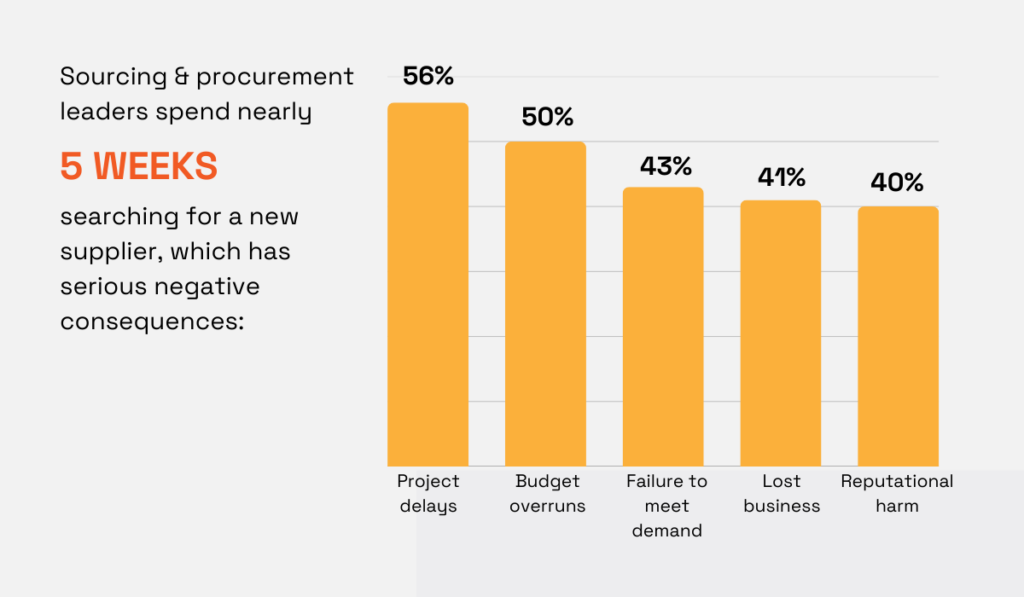
Illustration: Veridion / Data: TealBook
So, why is the discovery phase so slow?
The short answer: it’s still a manual, fragmented process.
Procurement professionals spend too much time sifting through outdated databases, fragmented supplier lists, and chasing siloed internal knowledge.
Many internal supplier records are incomplete or inaccurate, making it difficult to evaluate potential partners.
And even structured supplier portals aren’t a silver bullet.
Don’t believe us?
Another TealBook research shows that 58% of procurement professionals who use supplier portals don’t trust suppliers to keep their profiles up to date.
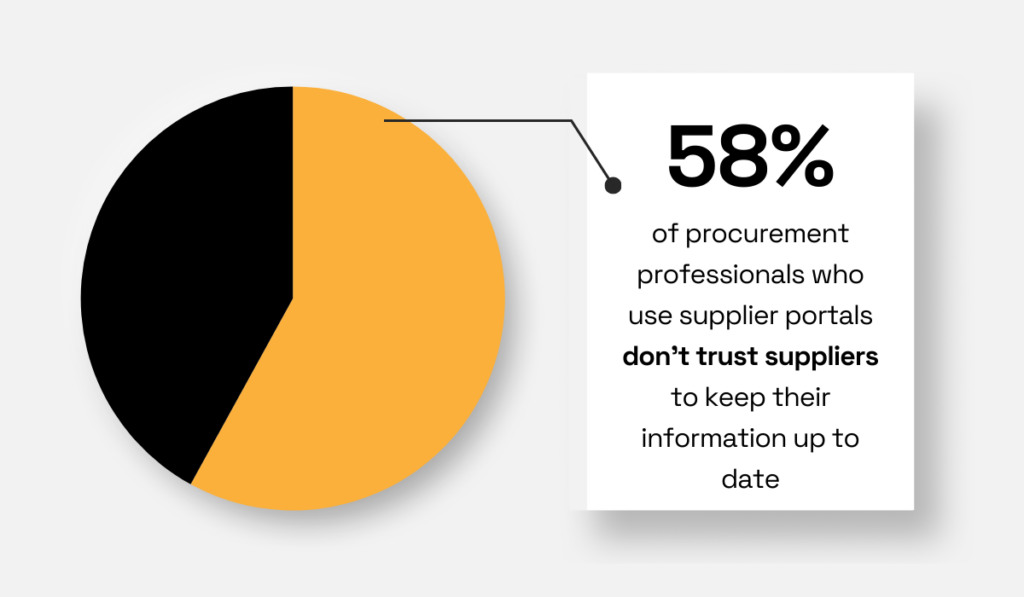
Illustration: Veridion / Data: TealBook
That means even when using structured databases, procurement teams are still working with outdated or missing data.
Additionally, traditional search methods limit supplier visibility.
Without access to a broader, real-time supplier base, teams may overlook better, more competitive options simply because they don’t appear in their existing data sources.
The result is a longer, more complex, and potentially unreliable discovery phase that sets the entire procurement cycle back.
After weeks of searching, you’ve finally built a shortlist. Now it’s time to evaluate suppliers and make a choice.
But supplier selection often becomes just as time-consuming, if not more so.
Take the tendering process, for instance.
For larger sourcing projects, managing an RFP is practically a full-time job.
Procurement teams typically need to:
Simply put, it’s time-consuming, resource-heavy, and often disconnected.
One furniture company went through this exact struggle, as they explain:
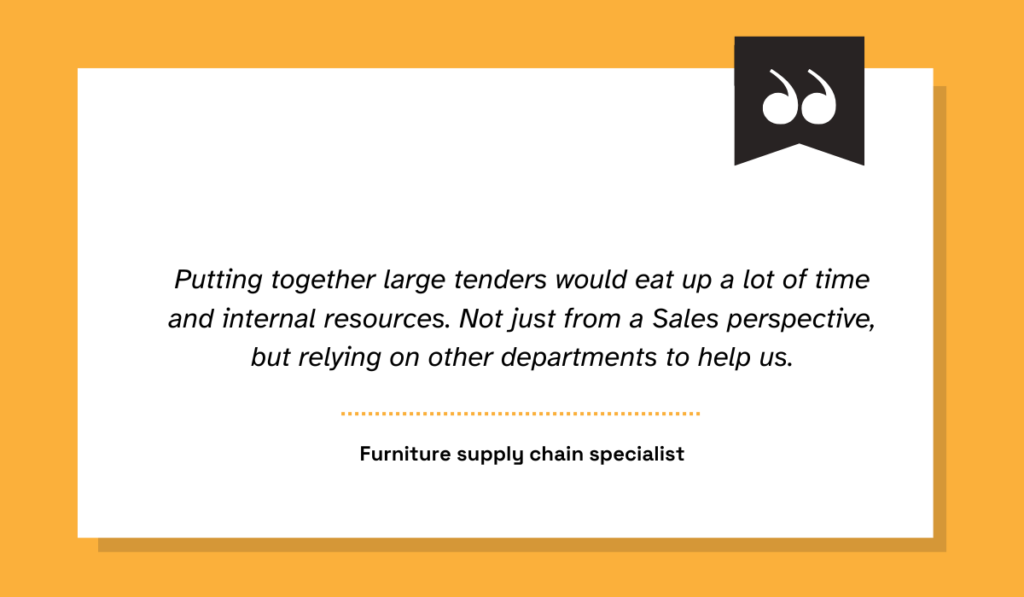
Illustration: Veridion / Quote: Market Dojo
And while teams are busy coordinating and chasing responses, real-world conditions are shifting.
By the time all bids are received and reviewed, key suppliers may no longer be available, prices may have changed, or internal requirements may have evolved.
The selection process becomes outdated before it’s even done.
Even after the bids are in, comparing responses is challenging, too.
If you’re using spreadsheets or disconnected tools, it’s nearly impossible to make fair, data-driven comparisons, especially at scale.
That leads to gut decisions, missed opportunities, or delays caused by internal indecision.
Even after a supplier is selected, finalizing contracts is another hurdle procurement teams deal with.
Negotiations often stretch for months, delaying procurement decisions and creating frustration for both buyers and suppliers.
Mike O’Brien, the CPO and founder of ContractAI at App Orchid, has experienced this firsthand:
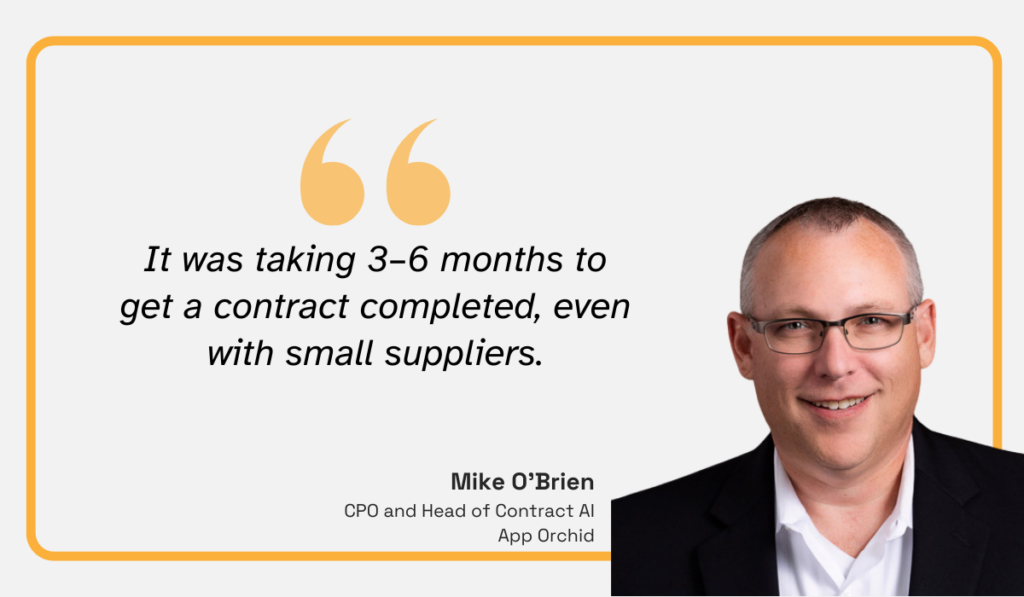
Illustration: Veridion / Quote: LinkedIn
He also discovered that almost 70-80% of the team’s time was spent negotiating terms and conditions, and very little time was spent on the statements of work, deliverables, and milestones.
Lengthy negotiations create additional risks.
The longer a contract remains unsigned, the greater the chance of losing supplier availability, facing pricing fluctuations, or experiencing further supply chain disruptions.
This lack of speed is especially problematic in today’s volatile supply chain environment.
In 2024, global supply chain disruptions increased by 38% from the previous year, according to Resilinc’s EventWatchAI.
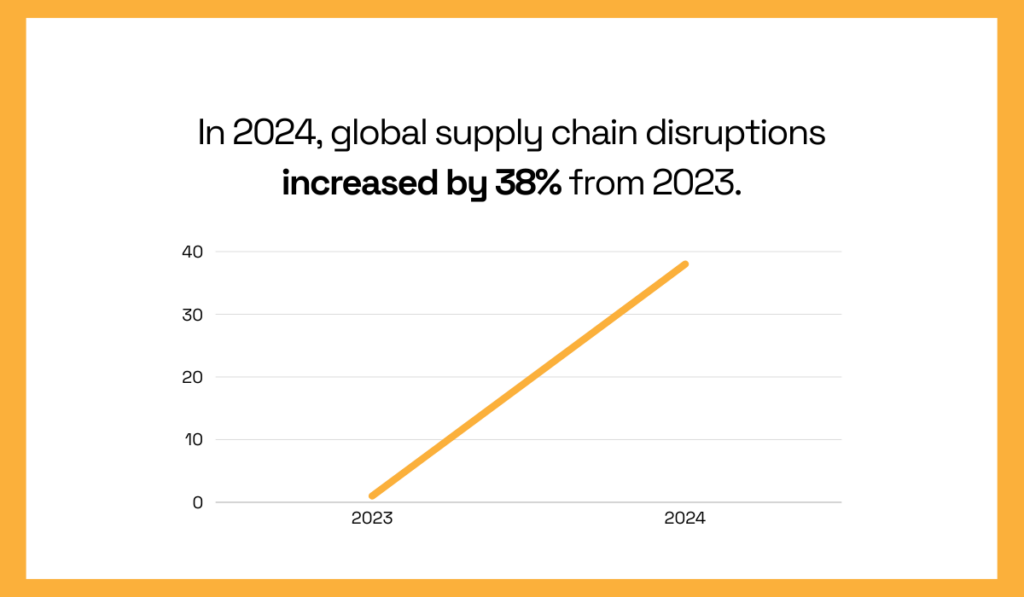
Illustration: Veridion / Data: Resilinc
In this environment, the companies that win are the ones that can move fast.
The ability to quickly find alternative suppliers is now a competitive advantage, as Maggie Brommer, Head of Procurement for Unilever’s Prestige Products, points out:
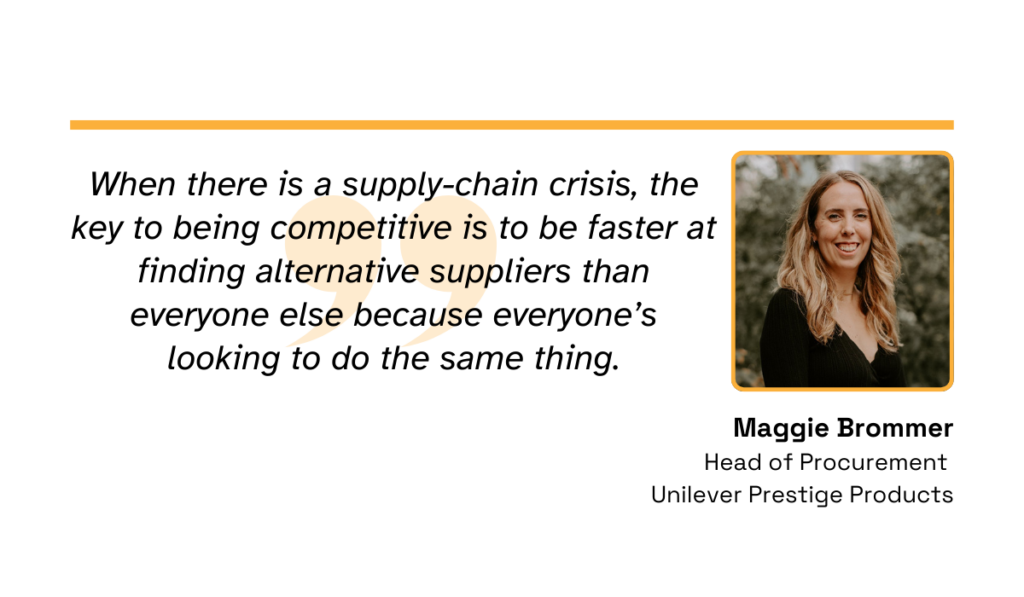
Illustration: Veridion / Quote: HBR
But speed isn’t just about finding a supplier.
It’s also about evaluating them, negotiating terms, and closing deals faster than your competition.
With outdated, manual tools, that’s just not possible.
You’re stuck in endless email chains, back-and-forth approvals, and fragmented workflows, while your competitors are already onboarding new suppliers.
But these challenges don’t have to be the norm.
Procurement can be faster, more data-driven, and seamlessly connected from start to finish.
The key lies in moving away from outdated supplier lists, Excel trackers, and disconnected workflows—and embracing a smarter approach powered by AI.
Instead of losing time digging through stale databases or waiting on referrals, procurement teams can now discover, validate, and engage suppliers through a single, integrated flow.
That’s exactly what the combination of Veridion and Market Dojo makes possible.
Veridion is the engine behind supplier discovery, using AI and machine learning to continuously scan and structure petabytes of information from across the internet.
It maintains real-time data on more than 120 million companies across 250+ geographies, with weekly updates to ensure procurement teams always work with the most current and reliable supplier information.
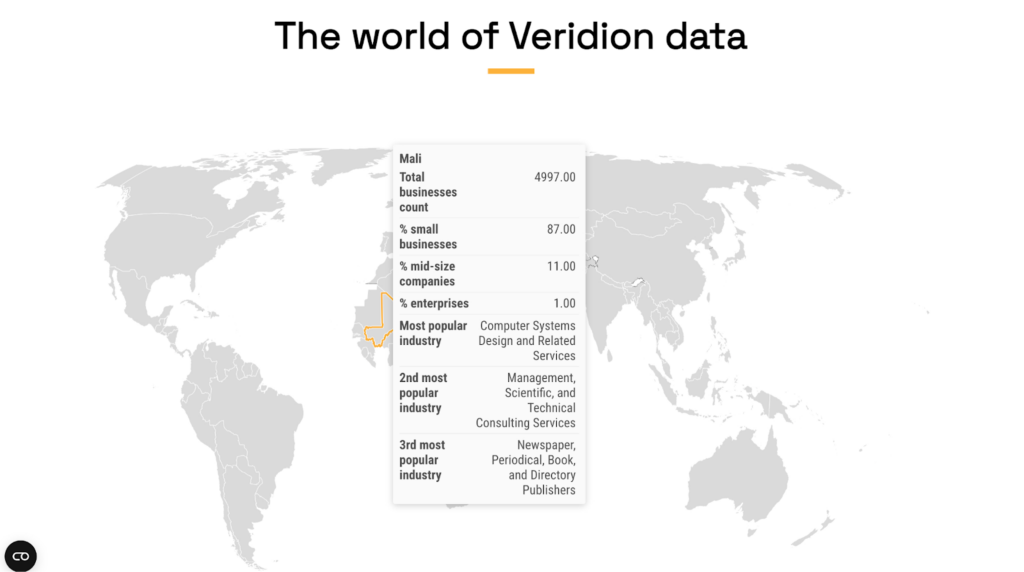
Source: Veridion
This includes data on operational capabilities, certifications, locations, ESG standards, and compliance metrics, structured across more than 60 data points per supplier.
This level of granularity means you can filter based on very specific needs, like finding suppliers who meet certain environmental certifications, operate within a particular region, and have a minimum production capacity.

Source: Veridion
Veridion also verifies that these suppliers are active and relevant, removing the guesswork that comes with static supplier lists.
When you connect that kind of intelligence directly with Market Dojo’s eSourcing platform, you’re no longer jumping between tools or re-entering supplier data into spreadsheets.
Market Dojo is built to manage the rest of the sourcing journey—from RFIs and RFPs, to eAuctions, to onboarding and contract management.
The process becomes streamlined, structured, and traceable from discovery to negotiation.
Alun Rafique, CEO and Co-Founder of Market Dojo, explains that the platform was designed to tackle the very challenges procurement professionals face every day: rising costs, increasing risks, and a lack of reliable data.
Source: Market Dojo on YouTube
And with Veridion now integrated, it also addresses the root problem of slow, unreliable supplier discovery.
Nick Drewe, COO at Market Dojo, put it this way:
“Veridion’s innovative approach to supplier data ensures our users gain access to accurate, real-time insights, enabling smarter, faster, and more informed sourcing decisions—all within a single, seamless platform.”
In practical terms, this means procurement teams can now run the entire sourcing process in one place—fast, connected, and fully data-driven.
Here’s how:
No silos. No delays.
Just one seamless, smart flow from discovery to negotiation—and beyond.
The integration of Veridion and Market Dojo gives procurement teams the edge to work smarter, move faster, and mitigate risk with confidence.
Let’s explore exactly how in more depth.
The most immediate impact is speed.
With AI-powered search across real-time, always fresh supplier data, you can identify viable suppliers in minutes instead of weeks.
The visual below shows just how faster Veridion supplier search is compared to a manual one, and how many more potential suppliers you can find.

Source: Veridion
That speed becomes mission-critical in moments of disruption.
According to the previously cited TealBook research, nearly two-thirds of procurement professionals say up-to-date supplier data helps them act fast during a crisis.
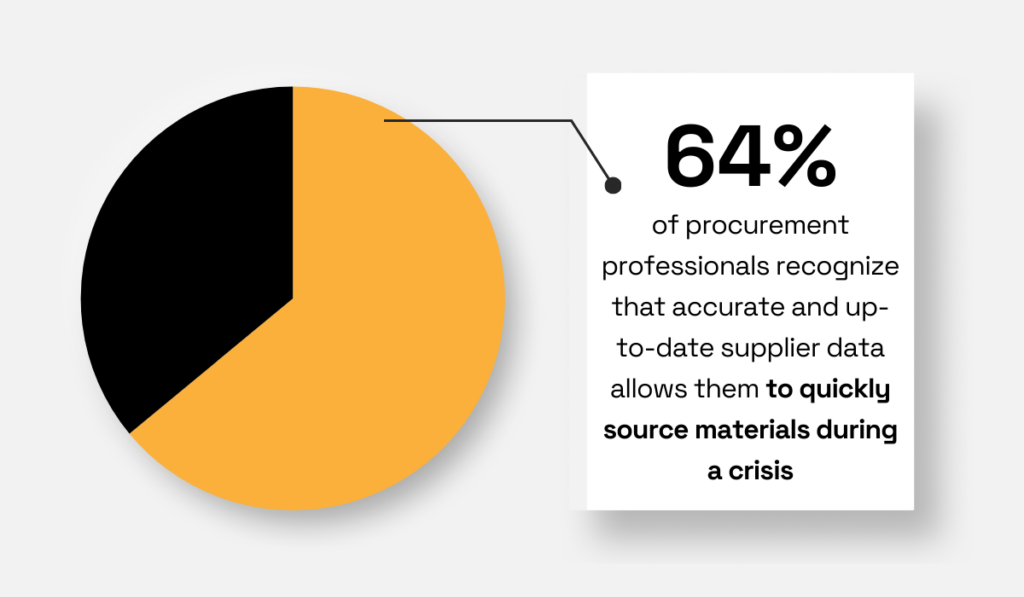
Illustration: Veridion / Data: TealBook
It also strengthens day-to-day decision-making, fueling better forecasting, identifying trends earlier, and giving you more strategic control.
But fast discovery is just the beginning.
What sets this integration apart is how it connects discovery with execution.
Once a supplier is identified through Veridion’s embedded marketplace, you can launch RFQs, RFPs, or eAuctions directly in Market Dojo—no copy-pasting, no switching tools, no risk of losing context or data.
The entire sourcing workflow stays in one place.
That means you reduce delays, improve stakeholder collaboration, and ensure all decisions are based on the most up-to-date information.
And this kind of structured flow has a real impact.
A Market Dojo customer in the furniture industry reported that having everything in-platform made it significantly easier to compare supplier responses and make faster, better-informed decisions.
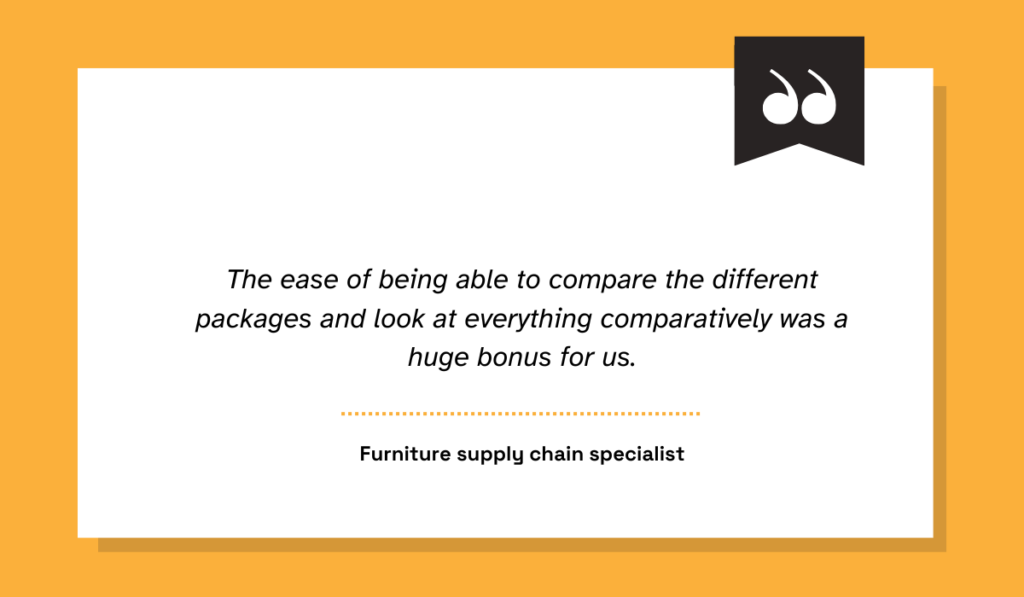
Illustration: Veridion / Quote: Market Dojo
What previously required days of back-and-forth was simplified into a single, efficient tender process.
Risk management is another area where the integration stands out.
With Veridion feeding live compliance, ESG, and other risk data into the platform, you don’t just hope your suppliers meet standards—you know they do.
And if something changes, like a supplier losing a certification or facing legal trouble, you get alerts immediately.
That level of transparency helps avoid surprise disruptions, contract breaches, or reputational damage.
It also helps mitigate several key risk areas that procurement teams face daily:
This is especially critical now, when ESG regulations have skyrocketed in the past decade.
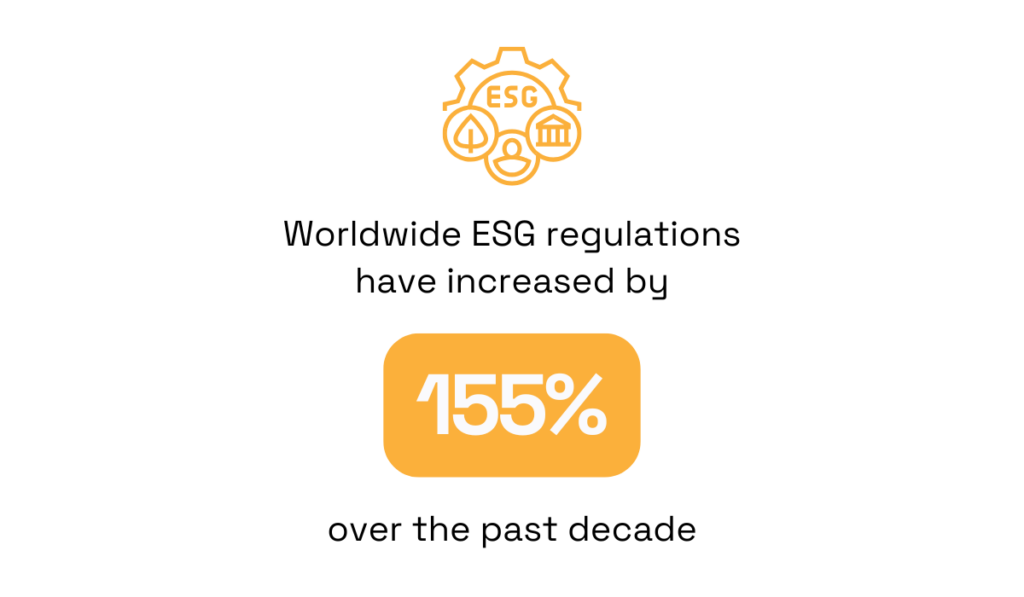
Illustration: Veridion / Data: ESG Book
Failure to comply can lead to fines, delays, or even loss of access to high-value contracts.
But Veridion’s rich ESG taxonomy helps you screen suppliers thoroughly, while Market Dojo structures that due diligence into your onboarding and contract workflows.
So, compliance never falls through the cracks.
Moving seamlessly from supplier discovery to selection, negotiation, and beyond is entirely possible with the Veridion and Market Dojo integration.
This solution doesn’t just make procurement more efficient.
It gives you control.
It transforms sourcing from a reactive process into a strategic advantage, where you can move fast, act on real-time data, and reduce risk without sacrificing transparency or precision.
Ready to see what that looks like in action?
Explore how Veridion and Market Dojo can power your next sourcing project.